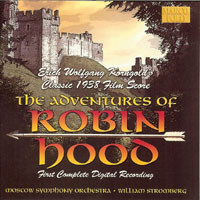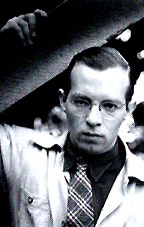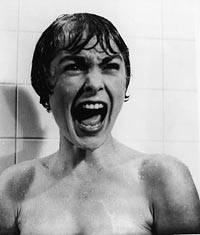
An interview with
Edmund Stone,
host of "The Score"
Roger Hall (RH): I’m pleased to speak with Edmund Stone, host of the acclaimed program, “The Score,” on All Classical in Portland, Oregon. Welcome , Edmund.
Edmund Stone [ES]: Thank you, Roger, a pleasure to be with you.
RH:
After looking at your excellent online site, I see you have a broad view of film scores, both past and more recent. Can you tell our readers how you first began your program that is now heard on radio stations across the USA?

ES: It was a rainy November day – sounds like the beginning of bad novel, doesn't’t it (laughter) – a rainy November day in 2005 in Portland, a typical overcast day and I was on the shift on a Saturday afternoon and I just felt that everybody needed to be cheered up and I reached for a CD I wanted to play, which was THE ADVENTURES OF ROBIN HOOD by Korngold, and I got some emails from people saying how much they were cheered up by that, and then did the same thing the next week and didn’t tell management at all. After about the third week of doing this, I said to the audience to write to me and tell me in you’d like to have a program of film music on a Saturday afternoon and if you wouldn't tell me. After we did the tally we had 93 emails, 90 of which were positive, 1 was on the fence, and 2 said no. I took the results to management and I said I think we have a good program but they were skeptical because they thought that film music wasn’t necessarily good on a classical station. So they gave me one hour a month and the numbers came in and it was very successful. Then we went to twice a month, then every week, then syndicated and it was our first syndicated program. Now, oddly enough, it’s the most listened to film music program in North America, with somewhere in the region of 250,000 people in 57 cities listening to “The Score” every week on their radios and probably just as many on the Internet.

RH:
I notice you pay tribute to anniversaries, which I like to do. I listened recently to your wonderful program on the Music From Hollywood concert from fifty years ago in 1963, with your guests: Jon Burlingame and John Mauceri.
ES:
Yes, I just got a message from John [Mauceri] about how much he liked the show.
RH:
How do you keep up with these anniversaries and how do you plan your weekly programs?
ES:
I have ideas which suddenly occur to me. I have a lot of themes that go on in my head. For example, in November it's Randy Newman’s 70th birthday, actually on Thanksgiving Day itself. 
And earlier this year we had Jerome Moross’s centenary and I’m very good friends with Susanna Moross, the composer’s daughter, and we talked a lot about this show and recorded an interview for this show. Then I have to build music around it. It’s not good enough to just have an idea, and I’ve some pretty good ideas but there hasn’t been the music for them, or at least there hasn’t been the symphonic music for them which is what this show is built around. I love to hear from listeners. They give me so many good ideas.
RH:
Like you, I enjoy paying tribute to film composers and anniversaries of significant film scores. Also, I have written a tribute for the Jerome Moross Centennial. Another composer whose 100th anniversary happens to be this year, is Walter Schumann, composer of the classic 1955 film score for NIGHT OF THE HUNTER.
![The Night of the Hunter [Original Soundtrack]](http://img1.imagesbn.com/p/743217205324_p0_v1_s260x420.jpg)
ES: Yes, I love that film. I think it's Charles Laughton's only film as director, am I correct? A wonderful film. A great role for Robert Mitchum. A really scary film. He plays a very, very bad guy. So yes, Walter Schumann's 100th anniversary. A couple of years ago, as you know, we had the 100th anniversary of Bernard Herrmann. So, we can’t let these moments go by.
RH: I wrote a book titled, A GUIDE TO FILM MUSIC, and I took the bold and perhaps foolish task of selecting the 100 Essential film scores of the 20th century. I won't ask you to be so bold to pick 100, but I wonder if you can pick a few scores that you consider the greatest or perhaps the ones you admire the most from the past.
ES: Well, we have one commonality, you and I, on your list of 20th century top 100, and that is CASABLANCA from 1943, which is a fantastic score from Max Steiner. Then I have four others which I'd like to share with you. One is perhaps my favorite film and that is CINEMA PARADISO, the Italian film that won the Academy Award and that of course is by Ennio Morricone. Another one by Morricone, and this might surprise you, is THE GOOD, THE BAD AND THE UGLY from 1966. And the reason I picked that was because Morricone had no budget to record the score. He chose to use the ordinary natural sounds -- the jaw's harp, the coyote cry, the harmonica, the trumpet, the wordless soprano, the whip crack, and he does it so well. A more recent film that I find myself listening to a lot is from 2010 and that's Danny Elfman's score to ALICE IN WONDERLAND. It does so much with the typical but beautifully ethereal soprano choir that he uses so much especially for his Tim Burton movies.
RH: Yes, I think Elfman has a special love for older film scores too. He has mentioned Bernard Herrmann, as one of the composers that he especially admires.
ES: Every time I interview composers these days I often ask them how did you get turned on to film scoring and very often it comes down to the same group of people -- it was Bernard Herrmann, it was Ernest Gold, it was Alex North, it was Jerry Goldsmith. It was these people who through the '50s, '60s and '70s inspired the younger people, like Brian Tyler and Henry Jackman, who are now scoring their own movies.
RH: For the past 13 years I’ve been inviting online readers to participate in a free online event known as National Carry A Tune Week. One of the six tune categories is film music. Over the years, there seems to be more movie songs selected. I wonder if you have an opinion why people pick more movie songs than film scores for the list?
ES: Well, a lot of it has to do with how you view a movie. What is it about that movie that stays with you? I like to whistle and a lot of people don't whistle anymore. We don't seem to do that as much, whether it's from a Bond film or a Henry Mancini theme. I think there's a clue there. When you remember an element from a film's score it has to be simple enough for you to repeat, however good or bad you are singing in the shower. There aren't many songs in movies anymore. So its the score that does that. One of the first to do that was Dimitri Tiomkin. In HIGH NOON he wanted to promote the song that was sung in the film by Tex Ritter and he couldn't get it released by him so it was by another singer [Frankie Laine] and he [Tiomkin] had a hit song and that helped to promote the movie. A little time before that was THE THIRD MAN. People were going around whistling the tune. In fact it was at the top of Billboard charts in 1950 for 11 weeks. So that meant a lot of people were whistling THE THIRD MAN theme and that certainly didn't hurt the movie or Anton Karas who composed and played it.
RH: In both HIGH NOON and THE THIRD MAN it was the song that helped to sell the movie, I believe.
ES: Oh, yes. If anyone needs to be convinced that songs help to sell movies then ask the Broccoli Family why they used songs in the James Bond films going back to the beginning in 1962. Those songs, which were always published separately and became in many cases stand-alone hits. Who cannot remember "Goldfinger" or "From Russia With Love," or "Live and Let Die," or "The Spy Who Loved Me"? "Nobody Does It Better" by Carly Simon. These are the songs that came from the movie but they had a life of their own.
RH: I think also the John Barry scores, which I think were the best, had a deciding factor in the popularity of James Bond films.
ES: Certainly they do. When you talk about the iconic quality of a film theme, there's two things you can do. I remember being in an audience when they were about to play a new Pink Panther movie, and the moment that the music started to come on the screen long before there was any action, the people around me started to smile and laugh. And this was in Scotland, a tough crowd to please sometimes. If a moment of a tune can do that even before you see any action on the screen, this must be a good film. And on stage with an orchestra I'll say I bet you can name this soundtrack with just the first three notes. And I use three examples of this. One is the PINK PANTHER. One is THE MAGNIFICENT SEVEN. And the other is the theme from ROCKY. And the funny thing is there are all repetitive notes. And perhaps STAR WARS would be there too. Within the first four or five notes or certainly four or five chords, I'll bet your audience can identify that movie just because of the sound. That says an awful lot, Roger, about the quality of that music.

RH: When I saw PSYCHO the first week it opened in 1960, there were people in the audience so terrified that when the famous shower scene came on that they had to leave the theater. I had never seen anything like it, at least at that time. That was because of Bernard Herrmann's absolutely terrifying music that he wrote for that scene.
ES: I was lucky enough to be the last British journalist to interview Hitchcock just months before he died in 1980, and he admitted that the soundtrack to PSYCHO was one-third of the movie. And Hitchcock was not given to praise.
I've created a Power Point, "A History of Music in the Movies," and it goes through seventy years of video clips and iconic scenes and the music that accompanies them takes the audience through in about forty minutes. And I use the shower scene from PSYCHO. When I look from the stage at the audience who are watching, they already know what's coming. The women will look away. Sometimes the men will look away and put their hand up over their eyes. Hitchcock originally didn't want Herrmann to score that scene. But when he heard it he knew that music had to stay.
RH: I wonder what your thoughts might be on film music preservation. Do you think there needs to be more film scores restored or is it about right what they are doing with recording labels like: Film Score Monthly, Film Tribute Classics, Intrada, Kritzerland, La-La Land and others?
ES: I completely applaud what's being done. It's bringing some very difficult scores back to us. Scores that may have gone onto an LP that is no longer available, they've cleaned them up so the mastering is better. I applaud every effort to bring film music back to an appreciative and hungry audience. That includes scores being restored from silent films. The full score to THE ADVENTURES OF ROBIN HOOD was lost, all we had was the Suite, and my friend William Stromberg and John Morgan sat down and listened painstakingly to that entire score and rewrote the score by listening to it note by note. And then with the help of Marco Polo and Naxos we have the full score as close as we can get it for THE ADVENTURES OF ROBIN HOOD and also for THE SEA HAWK.
RH: Thank you, Edmund, for taking the time to speak about a topic we both love – film music.
ES: It’s been fun, Roger. And thank you for your good work on Film Music Review.
Edmund Stone is host of “The Score” on All Classical, Portland, Oregon. Read more about past programs and other news at
The Score.org
You can send comments to him at Edmund@TheScore.org

For any comments on this interview, write to:
Film Music Review
New edition now available...
.jpg)
Get your copy of this popular book on DVD-ROM,
with bonus features
including
CD reviews and tributes,
music examples,
and a video program.
For more information, click this link:

